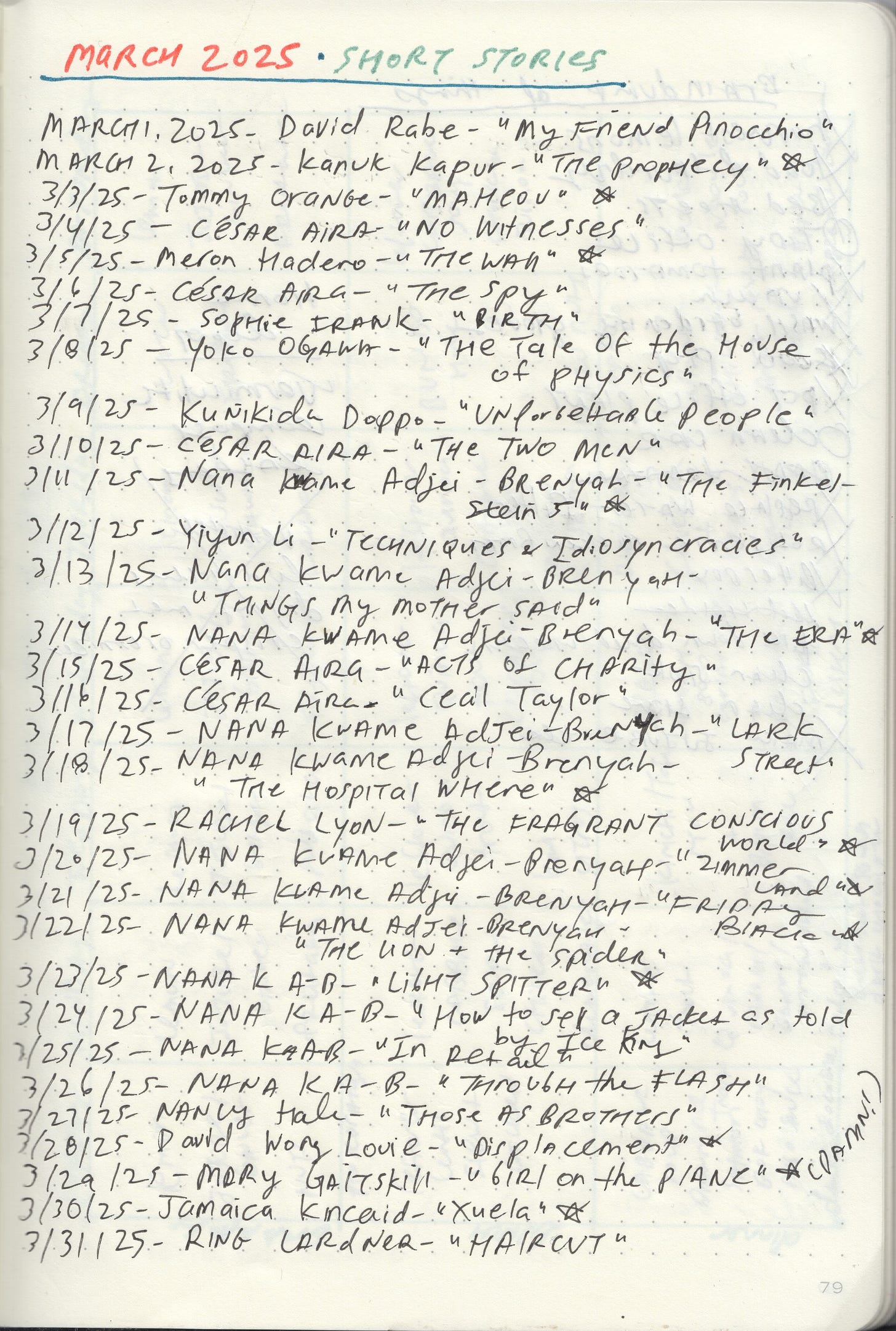"The Wall" by Meron Hadero
“I told him the wall seemed like it was everywhere, and the only thing I liked about it was those points you could touch that were covered in graffiti where people expressed a desire to overcome it.”
This March, a short story circulated online. Unfortunately, it wasn’t “Tapestry” by Edward P. Jones or “Sparks” by Susan Minot or “Rumpel” by Jessi Jezewska Stevens. The story wasn’t, as it turned out, even written by a human. It was “a metafictional literary short story about AI and grief” produced by OpenAI.
Because this was the internet, takes proliferated promptly: impassioned, assured arguments over whether or not the story was any good. Whether the line “Grief, as I’ve learned, is a delta” was genius or abomination. Because online, as usual, it had to be one or the other.
I won’t do that here. (I’ve written about AI writing elsewhere.) And I’m not, to be clear, recommending this story. Still, I bring it up, because in the last couple weeks I’ve been wondering: What makes a story human?
Among the many excellent human-authored stories I read in March was “The Wall” by Meron Hadero, which begins with a ten-year-old boy at an Iowan potluck. (The offerings: “potato salad, pasta salad, green bean casserole, bean salad casserole, tuna pasta salad casserole, a good three-quarters of the dishes on offer incorporating crushed potato chips and dollops of mayonnaise.” Would an LLM, trained against repetition, recognize this as the point?) The narrator is a recent refugee from Ethiopia via Berlin, and he speaks no English, only Amharic and German. Unexpectedly, he makes a German-speaking friend at this gathering: a former college dean who begins to tutor him in English.
A friendship emerges. Herr Weill is the only person he can speak at length to, in German; meanwhile, in school, he can’t make himself understood. The boy and man find common ground. Herr Weill “had been a refugee once, too, and had left home when he was a teenager because a war scattered his whole family.” Their experiences aren’t exactly the same, but they share a resemblance: “We talked about scars, invisible and visible, instant and latent ones, all real. How hard it is not to keep losing things because of conflict, even once it’s far away, miles or years away, and yet, how life fills up with other things all the while.”
Herr Weill gives the narrator a leather notebook, in which he begins to write down “questions, notes about my life, about the things I’d encountered and wanted to think about, conversations that were ultimately reflections of what I longed to say and hear.” And so the narrator discovers what many (human) writers know: that a journal, or any piece of writing that unfolds over years, is a way to be in a dialogue with ourselves over time. It’s a technology that enables and encourages that.
I’m struck by the movement within the story. “The Wall” moves even as it is about constraints: the Berlin wall, an inability to speak a new language. The wall ultimately comes down; the narrator’s English improves. Time passes, flows, and can be looked back upon.
OpenAI’s story can be read quickly, but it stays weirdly static at the same time: it never seems to build on itself; meaning never accrues. It benefits from speed-reading, because when you spend any amount of time with it, you find the images never ring as true as they appear. They’re “about grief,” and bear the semblance of sense (“Grief, as I’ve learned, is a delta”) but lack the precision, clarity, and feeling of a passage like this one: “We talked about scars, invisible and visible, instant and latent ones, all real. How hard it is not to keep losing things because of conflict, even once it’s far away, miles or years away, and yet, how life fills up with other things all the while.”
The AI story assumes grief is “statistically likely”—which, okay. But what it misses is the fact that though we might all feel grief, we don’t all feel exactly the same grief. Grief isn’t some smooth-surfaced, factory-outputted thing: it’s more like a rock each of us mines for ourselves, with gradations and facets and jagged edges. I experienced a small but sharp grief earlier this week, and was reminded that grief always involves the dimension of time. Grief extends both forward and back; it calls other grief to mind. In “The Wall,” the friends’ experiences aren’t exactly the same—how could they be? But recognizing that—trying to connect anyway—seems to me an essential part of human relationships, and also of human writing.
There’s a line in the AI story: “So when she typed ‘Does it get better?’, I said, ‘It becomes part of your skin,’ not because I felt it, but because a hundred thousand voices agreed.” It reads almost like a confession: the AI story emerged not from emotion, but from mimicry, consensus, and, frankly, theft.
Plenty of human writing mimics, too. How many of our emails are felt? It’s a model we’ve gradually adopted for ourselves: losing track of our own feelings and living, instead, by consensus. A couple days ago—very belatedly, apparently—I learned about Dubai chocolate, some kind of viral stuffed chocolate bar. Not because I felt it, but because a hundred thousand voices agreed, I thought. I worry that we are increasingly resembling certain technologies we’ve created: willing to flatten the dimensions of our own lived experience, losing touch with what we actually feel.
The AI story might elicit emotion, but it is of the lineage of the blunt-force emotion that being online engenders. I guess outrage is legitimate emotion. I guess projection is part of the human experience. But they’ve suffocated so much of the range we feel, I don’t find them particularly interesting anymore.
OpenAI’s story combines ingredients of fiction: detail, setting, character, simile, even something resembling charm. And sure, it’s edible. You could eat it. We eat all sorts of machine-made things: gummy bears, breakfast cereal, meat sticks. A meat stick does the job food is supposed to do: it tastes like something, it contains calories. Occasionally a meat stick is called for, but there’s something bereft about a meat stick, I don’t think it’s a great stretch to say.
Food tastes best when it’s made by someone who actually loves to cook. In “The Wall,” the narrator and Herr Weill spend whole days at the library together, so Herr Weill sneaks in “breakfast, lunch sandwiches, a snack, and a light supper.” In some cultures there is a word for the mysterious quality a good cook brings to her cooking: “nafas” in Arabic, “sondmat” in Korean. There’s no scientific explanation for what it is. Maybe it’s the cook’s hands, or her spirit; maybe it comes from attention and patience. What I know is that a meal that’s been thoughtfully and lovingly made feeds me not just technically, but spiritually and ineffably.
I should probably have deleted this whole part about meat sticks, but oh well: Short Story Not So Short, this time. This is all just to say, I don’t want to read meat-stick fiction! I want a meal made by someone who feels, who loves and who grieves (not generally but specifically), who is subject to time’s passing. A person who is one way, in one moment, and then has no choice but to be changed.
Read “The Wall” by Meron Hadero online or in her story collection, A Down Home Meal for These Difficult Times (2022), a very apt title. Thank you, Dinesh, for recommending “The Wall” to me!
This month I read Friday Black by Nana Kwame Adjei-Brenyah (immediate addition to my good story list) and finished César Aira’s The Musical Brain. I read: excellent stories by Tommy Orange and Rachel Lyon, both involving drugs. A few stories from 100 Years of the Best American Short Stories, including Mary Gaitskill’s “Girl on the Plane,” which elicited not only a star, but also a “DAMN!”
In some professional news: the paperback of Real Americans is out now! Same book, now less likely to bludgeon you. Every month I select one random commenter to snail-mail a short story to. This month, I’ll throw in a paperback Real Americans, too.






I love this newsletter so much!
This is a great read, thank you for sharing! Reminds me of Souvankham Thammavongsa’s story (and collection) ‘How to Pronounce Knife’. Language, like grief, is built upon layers of experience, and the protagonist in that story unfolds “all the little pieces of it” to capture the immigrant experience of being stuck between two worlds.
Also, how lucky for new readers to experience Real Americans for the first time, yay!